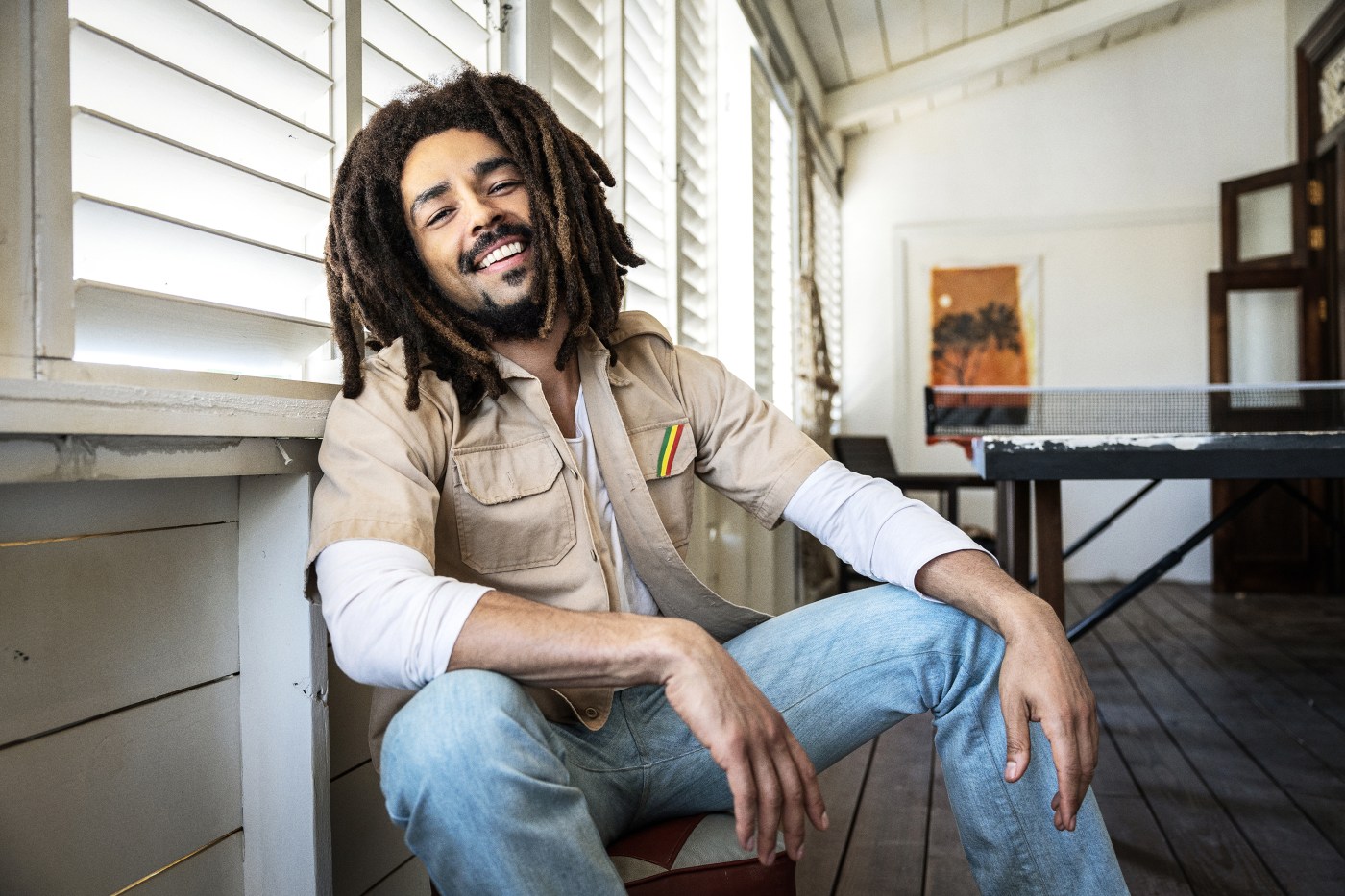
Movie review: Ben-Adir’s portrayal in ‘Bob Marley: One Love’ shines, but storytelling stumbles
How can you contain the meaning of Bob Marley in a single biopic? The pioneering reggae artist’s life was all too short, but his music has persisted infinitely, reaching far beyond the blue mountains of his native Jamaica, and he continues to be a global icon and a posthumous ambassador for Rastafarian culture 40 years after his death. But the man himself has been abstracted into an image for sale, a mere signifier adorning a dorm room poster, his songs of peace and freedom the dutiful standards of beach bar cover bands across the globe. Is it possible to tell the story of his life in a way that feels truthfully human?
These are the questions with which one wrestles in contending with the new biopic from director Reinaldo Marcus Green, “Bob Marley: One Love.” But unfortunately, the film itself does not undertake these complex matters. Though the film promises to tell a culturally and politically specific story, what could have been daring is ultimately trite, relying on familiar music biopic tropes. It’s a shame, because at the center is a bravura performance from Kingsley Ben-Adir as Marley.
Ben-Adir is uniquely suited to this role. Like the singer, he is of Afro-Caribbean (Trinidadian, specifically) and English descent, and he nails Marley’s Jamaican patois, which Green allows to flow as thick as it is, without subtitles. Ben-Adir captures Marley’s voice and his wild physicality, and Green smartly keeps the camera focused on his face in the concert performances, which are transfixing.
Lashana Lynch is also terrific as Rita Marley, Bob’s wife, backup singer, and the mother to (part of) his brood, including Ziggy Marley, who produced the film. We track Marley’s life story partially through his romance with Rita, and she serves as a steadying force. But the screenplay, by Terence Winter, Frank E. Flowers, Zach Baylin and Green, isn’t entirely concerned with the personal, but rather the political, or at least Marley’s symbolic function in politics — but only to a point.
“Bob Marley: One Love” opens with text explaining the violent unrest in Jamaica in 1976, but without substantive details. We are told there are opposing political parties and gang leaders in conflict, though we are not told why, just that Marley is planning to play a peace concert to unite the nation and that it will change his life. It would be nice to know what has sparked the unrest, why the nation teeters on the brink of civil war, and why Marley is necessary, but that’s not clarified, the first indication that this film is about to over-promise and under-deliver.
Kingsley Ben-Adir as Bob Marley in “Bob Marley: One Love.” (Paramount Pictures/TNS)
The timeline is contained to a heady period between 1976 and 1978, interspersed with flashbacks and fantasy — a perfectly fine approach, even if the film feels edited within an inch of its life and structurally incoherent at times. However, there’s a real verve and energy as it opens, situating us in Marley’s Jamaican life, and the cinematography by Robert Elswit is antsy and roaming, following our protagonist in constant motion: singing, dancing, jogging, hugging, toking.
The pressure is on to bring a calming presence to his unsettled nation, but an assassination attempt on his and Rita’s lives by gunmen in his home rattles him. He performs the concert but jets off to London immediately thereafter, settling in to lie low and write his seminal album, “Exodus.”
It’s at this point that “Bob Marley: One Love” falls prey to the dreaded music biopic cliché trap. There are songwriting sessions with lightbulb moments, uptight record executives and sketchy managers; a wildly successful tour montage with the requisite shot of records flying off the shelf. We watch Marley go from flesh-and-blood human being in Ben-Adir’s embodiment to flattened image, though the film rarely regards this process critically.
Marley’s music has permeated global culture, though whether his message has been preserved is debatable. ‘One Love’ does include several scenes of Marley’s Rastafarian religion and his spiritual guides. These scenes are as authentic as you will get in any Hollywood depiction, and the representation is deeply moving. Yet you wish to spend more time in this culture to understand why Marley was so called to it, what it provided him as a young man searching for meaning and chosen family, and to understand the tenets of Rastafarianism that he hoped to share with the world.
But we’re left adrift in the story with only generic beats providing a life raft. There’s a nagging feeling that the filmmakers should have just let the story breathe, that it didn’t need to be overly contextualized and nonlinearly presented, that the man and his music could simply speak for himself, especially with Ben-Adir’s capabilities. Though the actor embodies Marley beautifully, the storytelling ultimately fails to pay tribute to one of the most singular and iconic artists of all time.
‘Bob Marley: One Love’
2 stars (out of 4)
Running time: 1:44
MPA rating: PG-13 (for marijuana use and smoking throughout, some violence and brief strong language)
Where to watch: in theaters Wednesday
Related Articles
Movie review: Dakota Johnson embraces pure camp of ‘Madame Web’
Late night evolves slowly, as seen by ‘After Midnight’ and Jon Stewart’s ‘Daily Show’ return
Bell Museum’s Space Fest weekend kicks off with a free star party on Friday
Sheila Heti spent nearly 14 years on new book ‘Alphabetical Diaries.’ Here’s why.
New ‘Peanuts’ special rewrites Franklin’s origin story to address racist past


